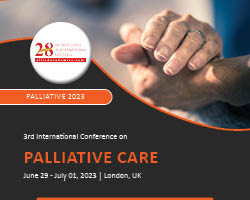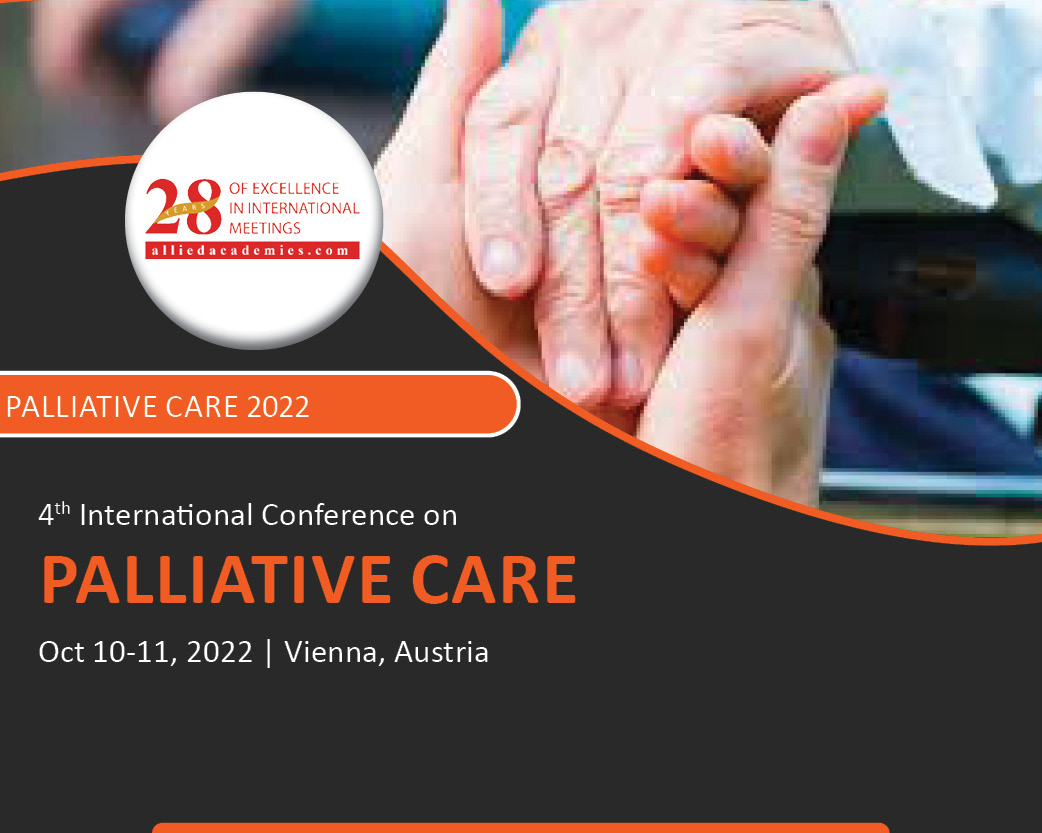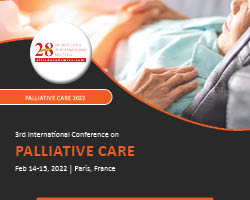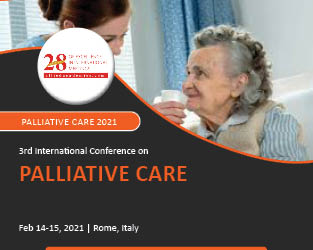2024 Conferences
2023 Conferences
2022 Conferences
2021 Conferences
AlliedAcademies welcomes you all to the Palliative CareConferences. With the great motive and immense dedicated approach towardsHuman Health progression and concerns, Allied Academies organizes Palliative CareConferences to withhold the enormous topics consuming the Palliative CareWorld and to improve the quality of patient’s life.
PalliativeCare is a team based medical care that is focused on improving thequality of life for people dealing with diseases or serious illness and theirfamilies. The team includes a team of doctors, registered nurses, registereddietitians, social workers and psychologists. The team focuses to providerelief from the symptom, pain and stress of a serious illness. Palliative Care adds asan extra layer of support in a patient’s life irrespective of their age to copeup with the stress associated with the illness as well as improves the qualityof life.
Meet the Global experts from palliative care teamand speakers at the Palliative CareConferences, to discuss on the steps taken to improvise the quality of lifefor patients and their families.
All the Palliative Care activityhas been planned and implemented in accordance with the accreditationrequirements and policies of the Accreditation Committee. The live format ofthis educational activity will be accredited with CME and CPD Credits.
AlliedAcademies every year hosts interdisciplinary international conferencesworldwide on cutting-edge basic and applied research in life sciences, Pharma, Medicine, Healthcare and Nursing deliveredby the best talents in industry and academia. Our conferences are oriented todrive the scientific community at large, facilitating access to the newesttechnical and scientific achievements and to shape future research directionsthrough the publication of applied and theoretical research findings of thehighest quality.
Palliative care conferences areconducted every year by Allied Academies in the areas like Aging, Geriatrics,Geriatric Medicine and Palliative care.
Geriatric care focuses on working with the elderlypeople and others with physical or mental impairments to meet their long termcare needs, improve their quality of life, and maintain their independence foras long as possible. Geriatric conferences provide an opportunity for manywell-known gerontologists, geriatrics scholars, policy decision-makers,professional activists, related companies, and researchers to get together andshare recent discoveries and studyresults.
Aging is the process of growing old or developing theappearance and characteristics of old age and study of the biology of ageing isone of the most challenging areas of biomedical research. Ageing is a triumphof development. People are living longer because of better nutrition,sanitation, health care, education and economic well-being. Although an ageingworld poses social and economic challenges, the right set of policies can equipindividuals, families and societies to address these challenges and to reap itsbenefits. The demands on the aging research community is growing with publicneed and aging conference will help us meet this challenge and try toaccelerate the development of solutions which enable to extend the healthyyears oflife.
Almost all large hospitals have palliative care teams and there are growing numbers ofteams in the community, including some that can visit the patients at home. Theaim of the palliative care conference is to gather all the socialworkers, clinicians, palliative care experts, doctors and registered nurses atone place to exchange their experiences dealing the patients with differentillness.
Perhaps, this palliative care conference would lay a strong platformtowards developing the methods by which the palliative care experts deal withthe patients and also to exchange new ideas to improve the quality of life.This palliative care gathering can also provide an opportunity forunderstanding deep about the stresses, emotional & social problems by whicha patient deals when he is affected by a health issue and also providesolutions or ways by which it can be dealt. Our Palliative care conferences are accredited by a CMEcertificate which enables with an expedient career. The experts will bebenefited with the certificate that will indicate renovated knowledge in recentresearch in their respective field. The CPD Certification happens to enlightenprofessionals to authorize their expertise into a structured and establishedapproach towards the hunger of knowledge.
Palliative care:
Palliativecare Conference | Palliativecare Conferences | PalliativeCare Nursing Conference | Palliative Education Conference | Palliative Therapies Conference | Palliative Medicine Conference | Healthcare Conference | Geriatrics Conference | Paediatric Conference | Palliativecare Congress | Palliativecare Events | Palliativecare Congress | Palliativecare Meetings | Palliativecare Gathering
Palliative care is a type of medical treatment for those who are suffering from a terminal illness. This kind of treatment focuses on easing the illness's symptoms and stress. The thing is to ameliorate the case's and family's quality of life. Palliative care is offered by a platoon of especially trained croakers, nursers, and other experts who unite with a case are other clinicians to give an fresh subcaste of support. Palliative care is grounded on the case's requirements rather than their prognostic. It can be given at any age and at any stage of a serious illness, and it can be given in confluence with restorative treatment. The palliative care staff will also take the time to help you match your treatment options to your objects. They will also insure that all of your croakers are apprehensive of and understand your wishes. This will ameliorate your quality of life by giving you further control over your care. People entering palliative care can continue to be treated for their sickness while under the care of their usual health care guru. Palliative care may be handed to persons suffering from conditions similar as Cancer, heart illness, lung complaint, order failure, madness, HIV/ AIDS, and ALS (amyotrophic side sclerosis).
Scope:
The Palliative Care Center assiduity is expanding. Fresh trade price or the assiduity's donation to the US frugality is anticipated to expand at an annualised rate of0.4 percent during the coming ten times, until 2023. This may be slower than in the United States. This rise (2.2 percent) for the same time is driven by declines in the early portion of the 10- time cycle in particular.
The worldwide women's health request has risen at an inconceivable rate in recent times, owing to an increase in the number of menopausal conditions among women. It's also anticipated that changing cultures and bad nutritive habits will contribute significantly to the entire request's adding deals. According to the exploration analysis, the worldwide women's health request was valuedUS$58.05 billion in 2016 and is anticipated to grow at a5.7 percent CAGR between 2017 and 2025.
According to TMR study prognostications, the global request for gynecological bias would grow at a4.8 percent CAGR between 2017 and 2023. This has the implicit to increase request possibilities from US $ million in 2017 to US $ million in deals by 2023. In terms of product bracket, gynecological surgical tools are at the van of the request. Advances in gynecological surgical outfit are attributed to the adding prevalence of laparoscopic single gash surgery and inventions in classic webbing surgery. Geographically, North America may be a profitable setting for gynecological particulars due to the first launch of ultramodern gynecological outfit.
Market Analysis:
Palliative care is given to cases suffering from conditions similar as cancer, congestive heart failure (CHF), CNS diseases, habitual pulmonary obstructive complaint (COPD), and others, and it includes characteristic relief for nausea and vomiting, diarrhea, pain and anxiety, loss of appetite, and other symptoms. Palliative care is defined by the World Health Organization (WHO) as a system to perfecting the quality of life of cases and their families who are defying challenges associated to a terminal illness by offering a remedy for reducing the symptoms of an underpinning complaint/ complaint. The worldwide palliative care request was valued at$ million in 2020 and is anticipated to reach$ million by 2030, growing at an8.4 percent CAGR between 2021 and 2030. Palliative care is a system of perfecting the quality of life of cases and their families who are dealing with challenges related to life- hanging conditions. Palliative care services help and relieve suffering by relating and treating pain and other ails that are physical, emotional, or spiritual as early as possible. Likewise, palliative care employs a cooperative approach to help cases and caregivers. This includes resolving introductory requirements and furnishing a support structure to help cases live as laboriously as possible until death. Palliative care is critical for a variety of habitual conditions, including cardiovascular complaint and cancer.
The increase in the senior population, the increased need for palliative care services in hospitals and conventions, the increase in the number of good croakers for palliative care, the increase in public mindfulness of life- hanging conditions, the relinquishment of a sedentary life, the increase in the operation of palliative care for homecare, and technological advancements in the healthcare assiduity are the major factors driving the growth of the palliative care request. Likewise, an increase in government support for the healthcare system, the development of new drugs for habitual conditions, and favourable payment from Medicaid and Medicare are all factors driving request expansion. Still, the lack of access to palliative care services in developing nations is likely to stifle request expansion throughout the protuberance period. On January 30, 2020, the World Health Organization (WHO) designated the COVID-19 outbreak a public health exigency of worldwide significance. COVID-19 has affected about 210 nations worldwide. Because utmost palliative care brigades are limited in size and different palliative care interpreters have reciprocal tasks, the burden for palliative care brigades increased during the epidemic. The use of telemedicine in palliative care redounded in advancements in symptom control, comfort care, and case and family satisfaction. Likewise, videoconferencing eased collaboration between the expert palliative care platoon nanny and community nursers, which is an important factor in the COVID-19 epidemic. As a result, COVID-19 had a favourable influence on the palliative care assiduity.
Current Trends in Palliative Care:
- Identify and treat common symptoms by creating innovative patient-reported outcome measures.
- Create novel approaches to treating common and rare illnesses such as dyspnea, malignant ascites, and chronic pain.
- Improve your ability to convey care objectives and life plans in a compassionate and hopeful manner.
- Increase understanding of the impact of palliative care in addition to standard treatment.
- Palliative care should be extended to hitherto unstudied populations, such as phase I patients.
Association & Universities:
- Cardiff University, Cardiff, United Kingdom
- Latin American Pallium Institute - University of Salvador
- Fundacion Solatium Patagonia
- Flinders University - College of Nursing and Health Sciences
- Argentine Society of Gerontology and Geriatrics (SAGG)
- The University of Technology Sydney
- Paracelsus Medical Private University, Umbrella Association Hospice Austria and St. Virgil Salzburg
- Federal University of Minas Gerais
- Felicio Rocha Foundation
- Princess Margaret Cancer Centre, University Health Network
- Lakehead University
- Institute for Life Course and Aging University of Toronto
- Division of Palliative Medicine, University of Toronto, Department of Supportive Care, UHN
- The University of British Columbia, Department of Medicine, Division of Palliative Care
- The European Palliative Care Academy , The Robert Bosch Stiftung Foundation
- University College Dublin
- The Irish Hospice Foundation , Royal College of Surgeons in Ireland
- Trinity College Dublin (TCD)
Hospitals:
Palliativecare Conference | Palliativecare Conferences | PalliativeCare Nursing Conference | Palliative Education Conference | Palliative Therapies Conference | Palliative Medicine Conference | Healthcare Conference | Geriatrics Conference | Paediatric Conference | Palliativecare Congress | Palliativecare Events | Palliativecare Congress | Palliativecare Meetings | Palliativecare Gathering
- Deer Valley Medical Center
- Houston Methodist Willowbrook Hospital
- Hoag Memorial Hospital Presbyterian
- Inova Fairfax Hospital
- Chi Mercy Health Mercy Medical Center
- Bethesda Butler Hospital
- Clifton Springs Hospital And Clinic
- Elliot Hospital
- Adventhealth Shawnee Mission
- Bristol Regional Medical Center
- Barnes-Jewish Hospital
- Great Plains Regional Medical Center
- Floyd Medical Center




